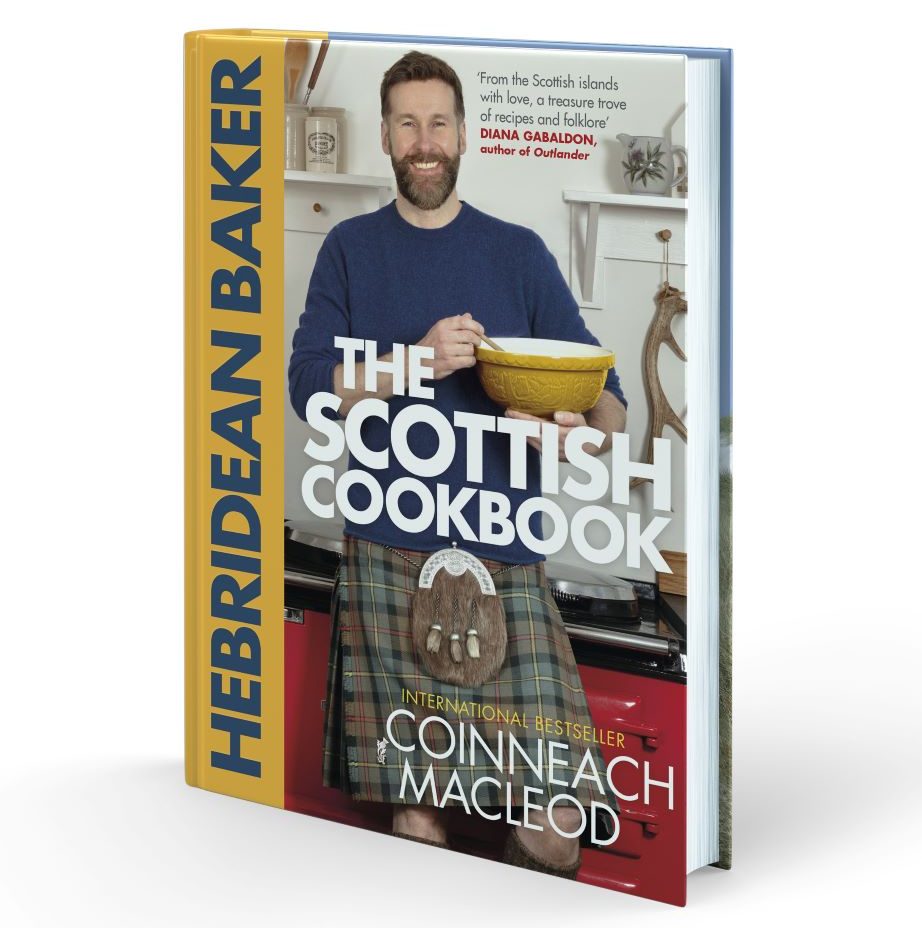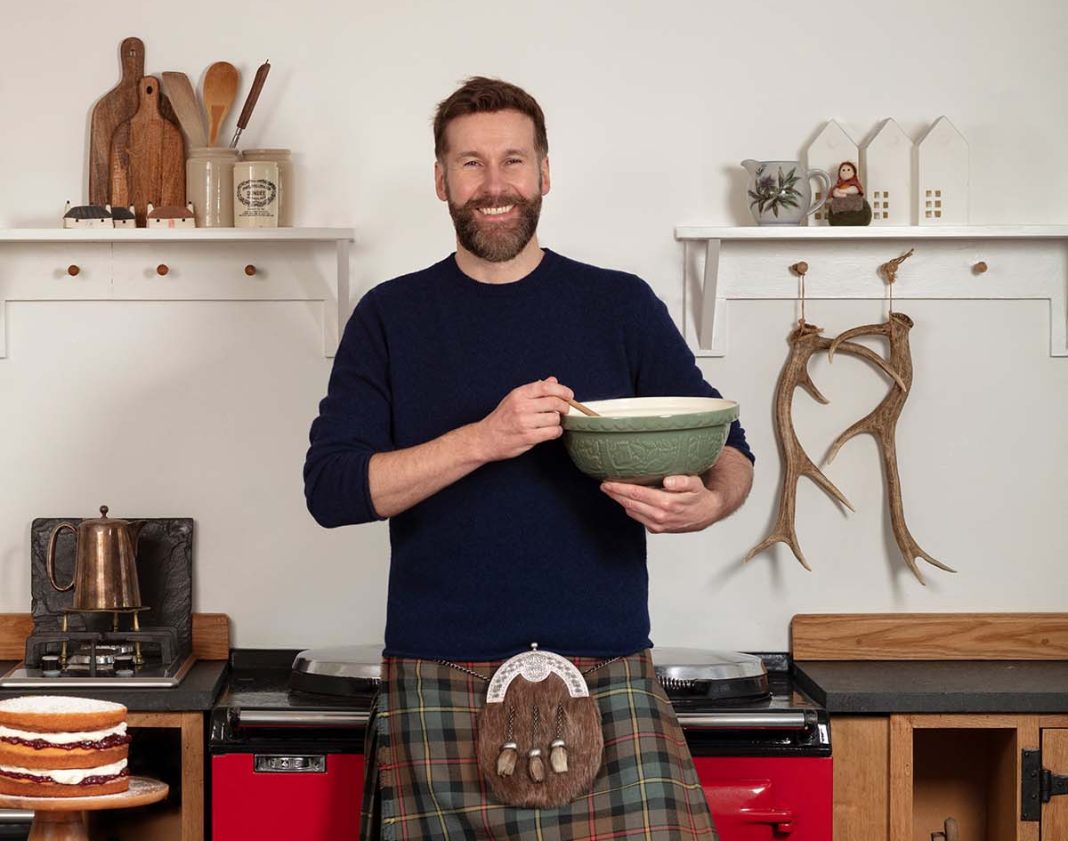We speak to Coinneach MacLeod, otherwise known as The Hebridean Baker, about his newest book The Scottish Cookbook
I never try to make people into Michelin star chefs. That’s not my job,” Coinneach MacLeod says with a smile and compassion in his voice. “In my new book The Hebridean Baker: The Scottish Cookbook, I strive to nurture people as passionate home bakers, passing on Scottish recipes that are rooted in tradition and nostalgia, but elevated by delicious wee surprises.”
The Lewis-born baker is in Edinburgh hosting an evening of stories and song to celebrate his fourth cookbook when we meet. We are sat in the Waterstones café on Princes Street in Edinburgh, each with a copy of The Scottish Cookbook in hand. Backdropped by a view of Edinburgh Castle, we flick through Coinneach’s most recent hardback of 75 recipes – a list that started as 100 ideas, often jotted on a small notepad that rests on his bedside table.
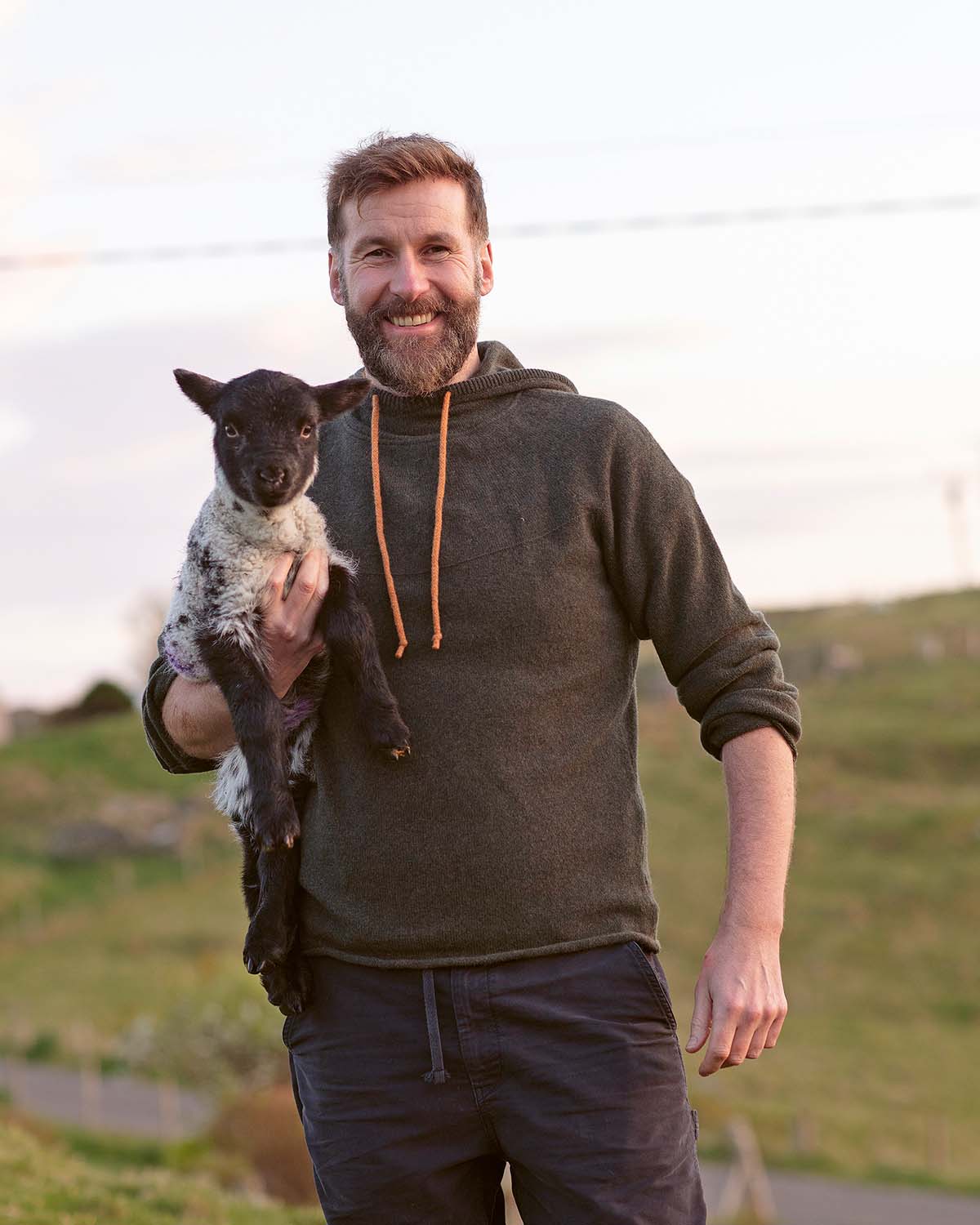
As we wait for his guests to arrive, Coinneach tells me, “I take note of every dish that comes to mind then whittle the list down by selecting recipes that make me smile, that are easy to follow and that look best on camera! Everything you see has been written with care and selected with home cooks and bakers in mind.”
The globally-celebrated author channels humour into The Scottish Cookbook, where recipe titles are light-hearted puns. Take Mothering Buns and Pàdruig’s Dunkers, for example… You’ll have to buy a copy of your own to discover the meaning behind those.
Readers can also expect a sprinkling of Gaelic storytelling, folklore tales, Scottish legends and memories from Coinneach’s life. “I love to tell stories about my life in cooking and music; about the friends and family who shaped my childhood and shape my life today,” Coinneach explains.
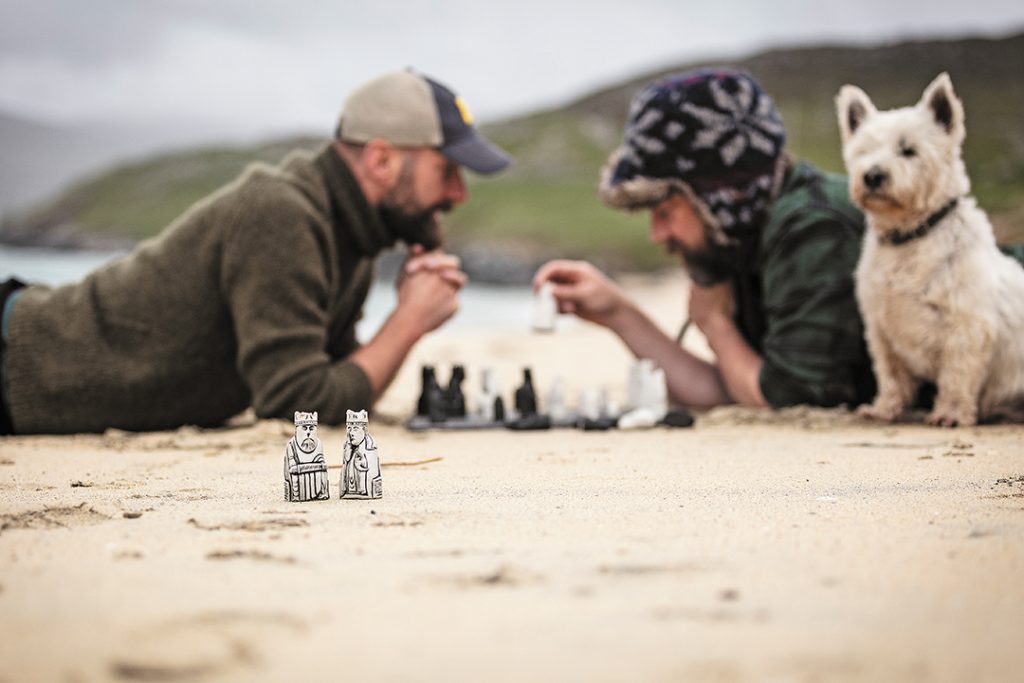
His love for wild Hebridean landscapes and the ingredients they yield shines on every page, thanks to captivating portraiture and landscape photography by Susie Lowe.
You will also find a handful of guest recipes from friends across the islands including Anne McAlpine, Clare from Café Cùil, bestselling author Donna Ashworth and film-maker Calum Maclean to name a few. “In my kitchen, flavours become stories, bakes become family favourites and recipes are shared through generations.”
Coinneach, who is the son of a trawler fisherman and Harris Tweed weaver, sites his Aunt Bellag’s clootie dumpling as the ‘beginning of it all’. “It was the first thing I ever baked and if I could only eat one thing for the rest of my life, it would be clootie dumpling.”
That first Scottish bake has taken him from the Isle of Lewis onto ITV’s This Morning and across oceans to the White House in Washington DC. “Since my first cookbook, I have baked with Venus Williams, James Blunt and a couple of hobbits too,” he laughs knowingly, letting the titbit hang in the air without further explanation.
Baking is what Coinneach is known for, but The Scottish Cookbook features some delicious savoury chapters, including Ceilidh Suppers and Soups and Pies. Highlights include the Rumbledethump Fish Pie, Ham Hock and Cider Pie, and the Isle of Mulligatawny Soup. The Beetroot Wellington is a vibrant option for veggies and the Neeps and Tatties Soup is one of our favourite “delicious wee surprises”.
“One of my friends requested I put ‘that soup from Mull’ in the book. And I racked my brain trying to figure out what on earth she meant… then I realised she meant mulligatawny soup – which has nothing to do with Mull! However, it makes for a fun title, so my Scottish take on the classic South Indian dish is titled Isle of Mulligatawny Soup!”
View this post on Instagram
Our conversation comes to a close as guests begin arriving. Everyone is welcomed with a friendly hello and a glass of Isle of Harris gin. All seats are soon filled and we settle in for an evening of storytelling and song. A ceilidh in its most traditional form.
Coinneach, his partner Peter MacQueen and their beloved westie Flòraidh take centre stage. Both men sport colourful Stoneybrek jumpers by Melrose-based knitwear designer Eribé Knitwear and Flòraidh has a wonderfully scruffy white coat keeping her cosy, too.
In front of a sold-out room, The Hebridean Baker relays tall tales from the Isles, including an anecdote from his father – “He caught lobsters for the queen and nobody in Cromore believed him!” – and a story from the 1940s about a Free Church minister, a nurse and a drag queen – “I met a woman who told me that this story was about her grandfather… I won’t tell you which character he was!” Coinneach has an intelligent and cheeky wit, and continues to politely deliver one liners that make everyone feel in on the joke.
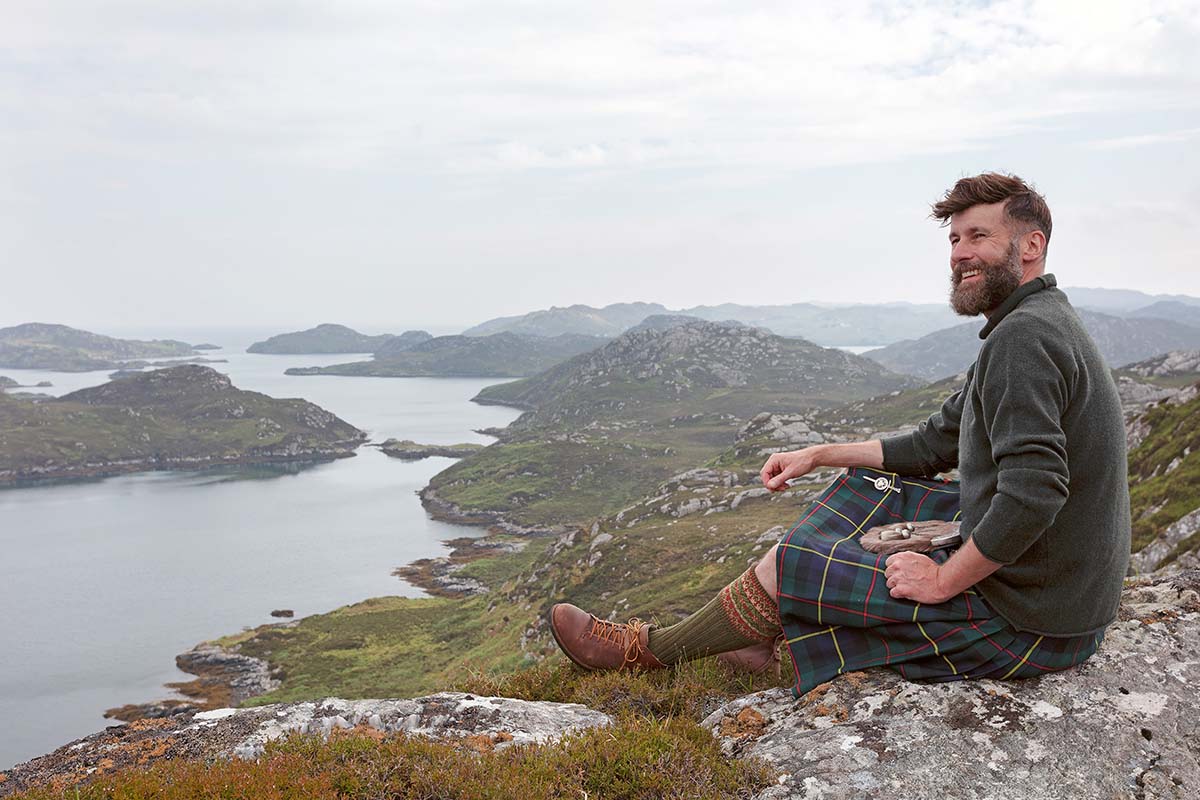
A delightful sing-a-long of one of Coinneach’s favourite tunes, Lights of Lochindal is saved for last. The crowd’s timid chorus dances between Coinneach and Peter’s warm vocals. Nothing sparks one’s patriotic sensibilities quite like hearing strong Scottish accents sing in unison.
The small ceilidh comes to a close as the quiet chorus lifts and the following round of applause settles. After nearly two hours in Coinneach’s company, I feel nostalgic for island memories that aren’t my own.
I wonder what I could do to feel more connected to the Hebrides. Maybe I’ll build a cabin on Lewis and live by the shores of Uig Sands. I could open a bookshop on Tiree, I think. Or I’ll learn Gaelic and move to Islay.
Suddenly I realise that all I need to do, is open my copy of The Scottish Cookbook.
Coinneach is currently touring The Scottish Cookbook across Scotland with dates available until January 2025. Find a date near you here.
Visit the Hebridean Baker website to find out more about The Scottish Cookbook | Follow The Hebridean Baker on Instagram | Follow The Hebridean Baker on TikTok
Two of our favourite recipes from The Scottish Cookbook
Cock-a-Leekie Orzo
Serves 4
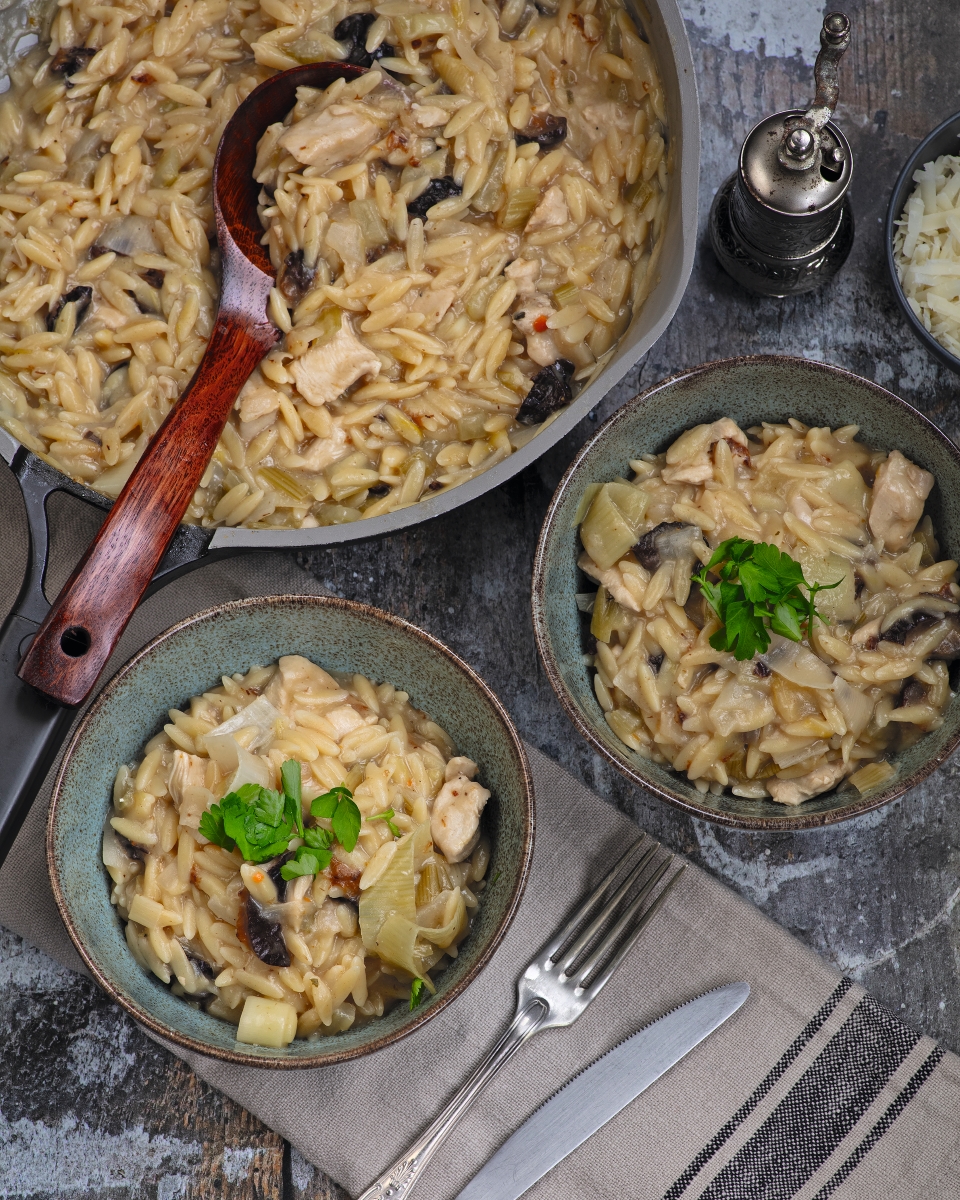
Originally a French soup, the forerunner of cock-a-leekie was introduced to Scotland in the 16th century, where the French onions were replaced with leeks, creating a dish that is now as famous for its name as for its taste! The flavours have inspired me to try them in a hearty, comforting midweek meal. It promises to delight the palate and satisfy the soul, as the traditional Scottish soup ingredients of chicken, leek and prunes blend harmoniously with Italian orzo pasta.
Ingredients
- 2 tablespoons olive oil
- 1 onion, finely chopped
- 2 leeks, thinly sliced
- 3 celery sticks, finely chopped
- 400g (14oz) orzo pasta
- 100ml (¹⁄₃ cup + 2 tablespoons) white wine
- 100g (3½oz) dried prunes, chopped
- 2 chicken breasts, cooked and shredded (or leftovers from a roast chicken)
- 1 litre (1 quart) chicken stock
- 50g (1¾oz) Parmesan cheese, grated, plus extra for serving
- Salt and freshly ground black pepper, to taste
Method
- In a large, deep frying pan, heat the olive oil over a medium heat.
- Add the onion, leeks and celery, sautéing until they begin to soften and become translucent; this will take about 5 to 7 minutes.
- Stir in the orzo pasta, coating it well with the oil and vegetables. Cook for a minute to lightly toast the orzo, which helps to develop its nutty flavour.
- Season with salt and freshly ground black pepper, then pour in the white wine, stirring continuously until most of the liquid has been absorbed.
- Mix in the prunes and chicken, then gradually add the chicken stock, stirring regularly, while allowing the mixture to simmer. The orzo should absorb the stock and become tender yet slightly al dente; this will take about 10 to 12 minutes.
- Once the orzo is cooked to your liking, remove the pan from the heat and stir in the grated Parmesan cheese.
- Ladle the cock-a-leekie orzo into bowls, garnishing each serving with a sprinkle of extra Parmesan cheese for added richness.
Strawberry Shortcake
Serves 6
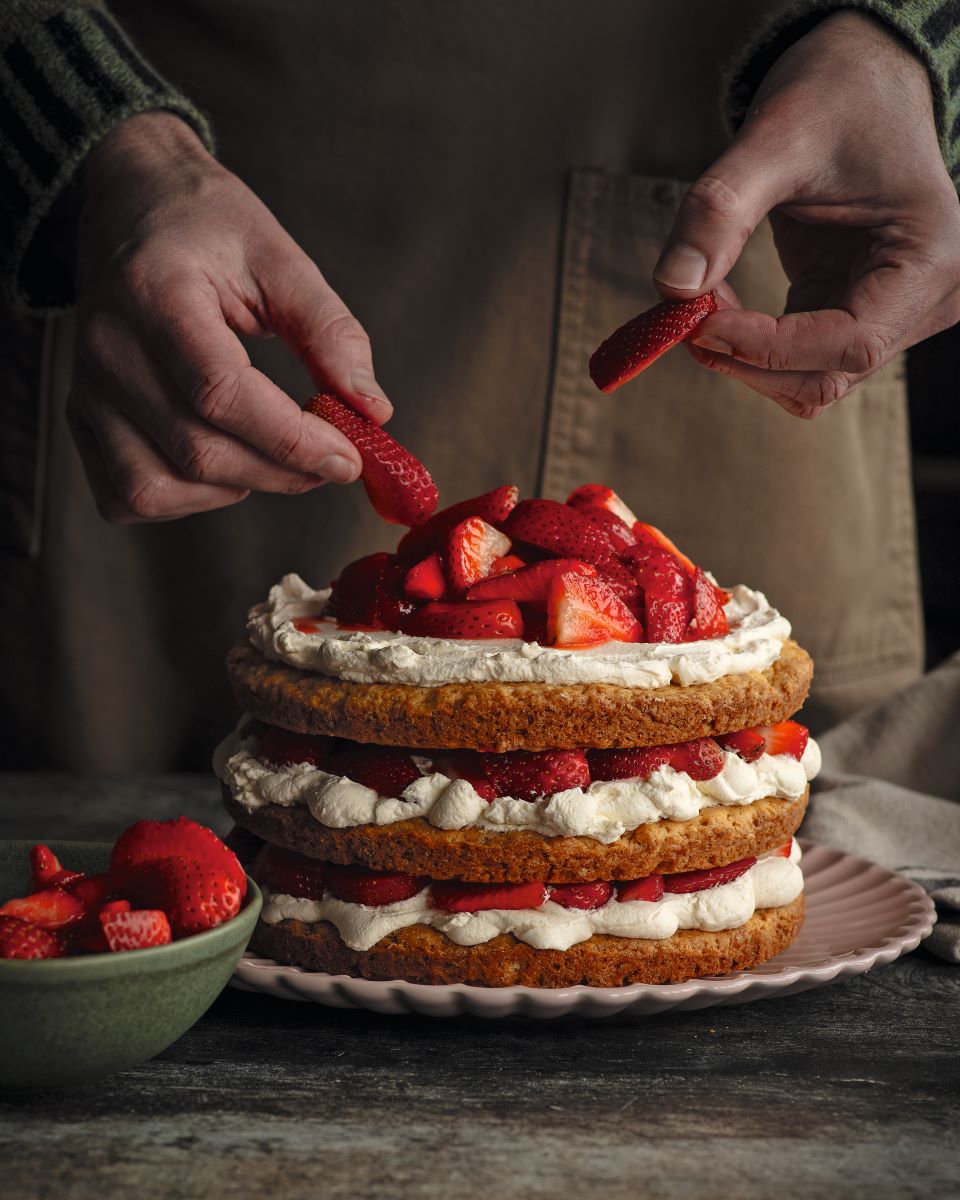
This three-layered crumbly shortcake filled with whipped cream and succulent Scottish strawberries is as beautiful to look at as it is delicious to eat. It’s optional to macerate the strawberries to top the dish, but I think it brings a sharp sweetness to contrast with the rest of the dessert. You can plan ahead and make the shortcakes the day before and assemble just before serving.
Ingredients
- For the macerated strawberries
- 200g (7oz) strawberries, hulled and quartered
- 2 tablespoons sugar
- ½ a lemon, juiced
For the shortcake
- 420g (15oz) plain flour, plus extra to dust
- 1 tablespoon baking powder
- 100g (3½oz) granulated sugar
- Pinch of salt
- 140g (4¾oz) butter, chilled and cubed
- 600ml (2¹⁄₃ cups + 2 tablespoons) double
cream
For the filling
- 480ml (1¾ cups + 2 tablespoons) double
cream - 1½ teaspoons vanilla bean paste
- 50g (1¾oz) icing sugar, sifted
- 475g (1lb 1oz) strawberries, hulled and quartered
Method
- To macerate the strawberries
- Take your 200g (7oz) of strawberries and combine them with the sugar and lemon juice in a bowl. Set aside for at least 2 hours and use to top the shortcake when you assemble.
To make the shortbread
- Preheat the oven to 200°C fan (425°F). Line 3 round 20cm (8”) cake tins with baking parchment.
- In a large bowl, combine the flour, baking powder, sugar and salt. Use your fingertips to work in the butter until the mixture resembles coarse breadcrumbs.
- Gradually add the cream, mixing until just combined.
- Divide the dough into 3 equal parts. Roll each part out on a floured surface to fit the cake tins and bake for 15 to 20 minutes or until golden. Cool completely.
To make the filling and assemble
- Whip the double cream with the vanilla and icing sugar to soft peaks.
- To assemble, place the first shortcake layer on a plate.
- Spread a third of the cream over the cake and top with a third of the strawberries.
- Repeat with the remaining layers, finishing with the macerated strawberries on top and serving immediately.
The Scottish Cookbook is the perfect Christmas gift
Coinneach explains that mastering the art of Scottish baking is more than just perfecting shortbread, scones and clootie dumpling. “It’s about capturing the heart and soul of Scotland in every dish,” he explains. “The Scottish Cookbook is a celebration of Scotland’s timeless culinary traditions and an introduction to new recipes sure to become future family favourites.”
